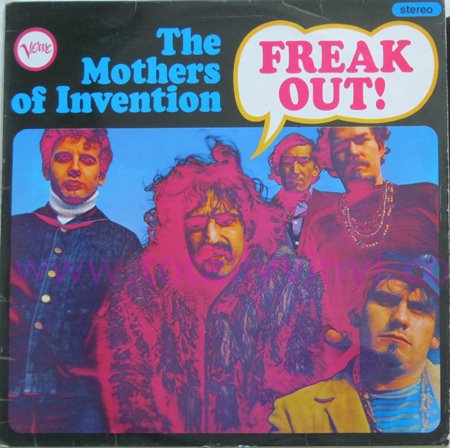Mothers of Invention: Freak Out! (Verve)
The first double-album of rock, was it Dylan’s “Blonde On Blonde” or Zappa’s “Freak Out”? It’s being claimed that the official release date of “Freak Out!” was June 27, 1966, preceding the Dylan classic by one or two weeks as “Blonde On Blonde” didn’t hit the Billboard chart until July 23. So Frank Zappa seems to be the winner even though “Freak Out” did not register on Billboard until early 1967.

Bob Dylan was a big star, his albums sold in truck loads from day one. The Mothers Of Invention were not. Their highly original and freaked out live shows did them good as word of mouth slowly turned them into the darlings of the growing counter-culture on the West Coast. They didn’t actually cross over, not in the beginning, as “Freak Out!” only reached a modest #130.
The album was anything but modest. The Mothers, disguised as the freakiest hippies of them all, delivered some very cunning satire, apparently mocking the establishment from any possible angle: say hello to a tricky government lying through its teeth and all its zombie like foot soldiers, the everyday man and woman and all their false values based on the brain dead cliché that is the American Dream. However, “Freak Out!” was not to be taken literally as it was a play, mocking just as much the freaked out youth that shared its apparent views. “Each tune had a function within an overall satirical concept.” (The Real Frank Zappa Book, 1989)
“I wish I was anything but a rock
Heck, I’d even like to be a policeman
Hey, you know what?
You know maybe if I practice, you know
Maybe if I pass my driving test
I could get a gig drivin’ that bus that pick the freaks up
In front of Ben Frank’s, right?”
Frank Zappa hit both ways. He was just as much lashing out at the burgeoning alternative dope head youth culture. Nothing annoyed him more than ‘sheeple’ – the herd mentality that wreaked havoc on both sides of the fence. To him the delusion of the hippie community’s values was as obnoxious as the fat lies of the establishment.
But using the hip language and rather simplified and naive views of the subculture as the basis of the album’s lyrical content, and dressing it up in music that touched so many bases it was hard to define and could very well pass as trippy stuff, Zappa turned the targets of his satire into his biggest fans. They could not see the satire as they spoke like that and thought like that themselves. The Mothers were their band, they were on their side.
The Mothers’ standing as counterculture gurus was not diminished by the ultimate insult: “We’re Only In It For The Money”, a Top 30 album in 1968. He poked them in the eye with a sharp stick, but the apathetic hippie sheeple just didn’t get it. How annoyed he must have been.
Zappa despised drugs. He was a hard-working and notoriously sober boss, and he expected the same from his crew, although they did sneak out to be naughty, hanging out with people like Jefferson Airplane, Grateful Dead and Quicksilver Messenger Service, and who wouldn’t have? But Mothers Of Invention were indeed special, you can already spot a plan, clear as glass, behind the apparent madness and chaos on “Freak Out!”
Zappa was a pretty vicious satirist. But he was also a spectacular musician with exceptional abilities when it came to editing chaos down to a structured plan. “Freak Out!” embraces the immensity of Zappa’s universe. He creates a wholeness of bits and pieces that seemingly are not related to each other at all. And although he is kidding ever so slightly, there is also a warm affection behind his use of traditional rhythm & blues, specially the doo-wop style that he constantly returned to all through his life.
On one end the catchy doo-wop style. On the other you’d find Zappa’s mathematical genes at work. He was unconditionally in love with the music of the innovative French composer Edgar Varèse (1883-1965), inventor of the term “organized sound”. In-between these extremes the album delivers whims and antics, at times hilarious. And there’s a nod to the Sinclair Lewis’ novel “It Can’t Happen Here” as the icing of the cake.
Released: June 1966
(All songs written and composed by Frank Zappa except where noted)
Side One
1. “Hungry Freaks, Daddy” 3:32
2. “I Ain’t Got No Heart” 2:34
3. “Who Are the Brain Police?” 3:25
4.” Go Cry on Somebody Else’s Shoulder” (Frank Zappa and Ray Collins) 3:43
5. “Motherly Love” 2:50
6. “How Could I Be Such a Fool?” 2:16
Side Two
7. “Wowie Zowie” 2:55
8. “You Didn’t Try to Call Me” 3:21
9. “Any Way the Wind Blows” 2:55
10. “I’m Not Satisfied” 2:41
11. “You’re Probably Wondering Why I’m Here” 3:41
Side Three
12. “Trouble Every Day” 5:53
13. “Help, I’m a Rock (Suite in Three Movements)
I. Okay to Tap Dance
II. In Memoriam, Edgar Varèse
III. It Can’t Happen Here” 8:37
Side Four
14. “The Return of the Son of Monster Magnet (Unfinished Ballet in Two Tableaux)
I. Ritual Dance of the Child-Killer
II. Nullis Pretii (No Commercial Potential)” 12:22
Musicians:
Frank Zappa – guitar, conductor, vocals
Jimmy Carl Black – percussion, drums, vocals
Ray Collins – harmonica, cymbals, sound effects, tambourine, vocals, finger cymbals
Elliot Ingber – alternate lead & rhythm guitar
Roy Estrada – bass, vocals
Gene Estes – percussion
Eugene Di Novi – piano
Neil Le Vang – guitar
John Rotella – clarinet, sax
Carol Kaye – 12-string guitar
Kurt Reher – cello
Raymond Kelley – cello
Paul Bergstrom – cello
Emmet Sargeant – cello
Joseph Saxon – cello
Edwin V. Beach – cello
Arthur Maebe – French horn, tuba
Motorhead Sherwood – noises
Kim Fowley – megaphone
Mac Rebennack – piano
Paul Butterfield – vocals
Les McCann – piano
Jeannie Vassoir – (the voice of Cheese)
Production:
Producer: Tom Wilson
Engineering director: Val Valentin
Engineers: Ami, Tom, Val Valentin
Assistant: Eugene Dinovi, Neil Levang, Vito, Ken Watson
Musical director: Frank Zappa
Orchestration: Frank Zappa
Arranger: Frank Zappa
Cover design: Jack Anesh
Hair stylist: Ray Collins
 |
 |
 |





